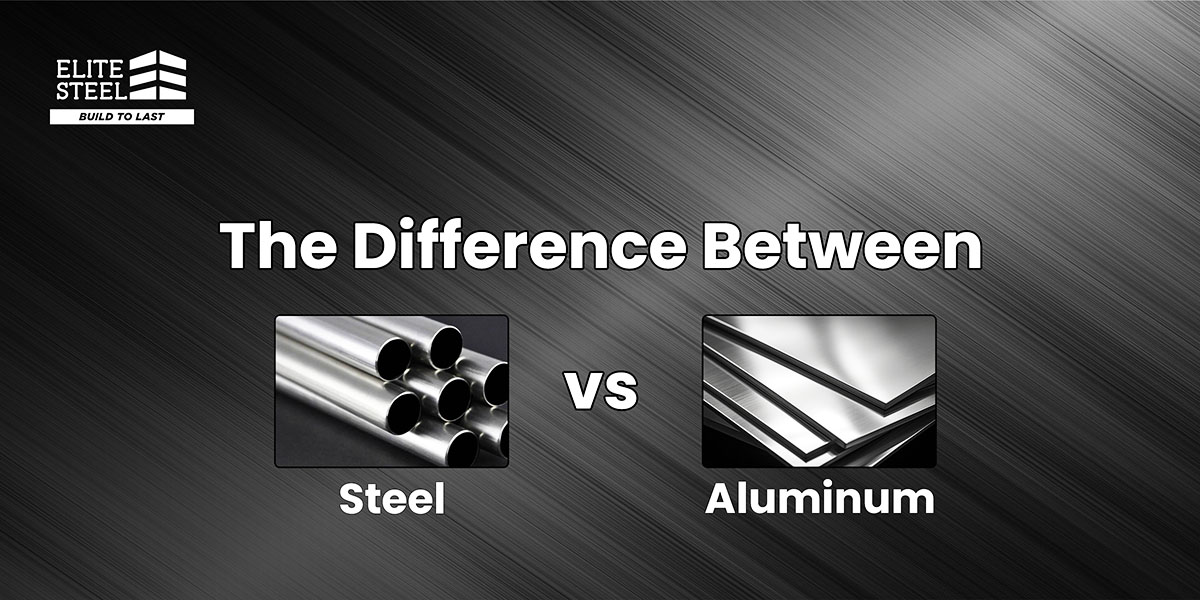The Difference Between Steel vs Aluminum
Steel and aluminum are two of the most widely used metals in the world, each with its unique properties that make them suitable for various applications. Understanding the differences between these two metals can help you make informed decisions for your projects. In this blog post, we’ll delve into the key characteristics of steel and aluminum, comparing them in terms of strength, weight, durability, cost, and applications.
Steel Vs Aluminum : Strength and Durability
- Steel: Known for its exceptional strength and durability, steel is often the preferred choice for applications that require high load-bearing capacity. It is particularly robust in structural engineering, construction, and heavy machinery.
- Aluminum: While not as strong as steel, aluminum offers a good balance of strength and weight, making it suitable for many applications. It is often used in aerospace, automotive, and consumer products due to its lightweight nature.
Steel Vs. Aluminum : Weight
- Steel: Steel is significantly heavier than aluminum, which can be a disadvantage in applications where weight reduction is crucial.
- Aluminum: Aluminum’s lightweight properties make it an ideal choice for applications where weight is a primary concern. This includes aerospace, automotive, and marine industries.
Steel & Aluminum : Corrosion Resistance
- Steel: Steel is susceptible to corrosion, especially in environments with moisture or exposure to elements. It often requires protective coatings like paint or galvanization to prevent rust.
- Aluminum: Aluminum naturally forms a protective oxide layer that resists corrosion, making it more durable in outdoor environments. This is why aluminum is commonly used in architectural applications and outdoor structures.
Steel & Aluminum : Cost
- Steel: Steel is generally more affordable than aluminum, especially in large quantities.
- Aluminum: While aluminum can be more expensive than steel, its lightweight properties and corrosion resistance can offset the higher cost in certain applications.
Steel & Aluminum : Thermal Conductivity
- Steel: Steel is a good conductor of heat, making it suitable for applications that require efficient heat transfer, such as radiators and cooking utensils.
- Aluminum: Aluminum is an excellent conductor of heat, even better than steel. This makes it a popular choice for heat sinks, cookware, and other applications where heat dissipation is essential.
Steel & Aluminum : Malleability and Formability
- Steel: Steel is less malleable than aluminum, making it more difficult to shape into complex forms.
- Aluminum: Aluminum is highly malleable and formable, allowing it to be easily shaped into various shapes and sizes. This makes it a versatile material for manufacturing and fabrication.
Applications
- Steel: Construction, automotive, shipbuilding, machinery, tools, and appliances.
- Aluminum: Aerospace, automotive, packaging, construction, consumer products, and electrical components.
Which is better steel or aluminum?
The best choice between steel and aluminum depends on the specific requirements of your project. Consider factors such as strength, weight, durability, cost, thermal conductivity, and formability when making your decision.
Final Word
Both steel and aluminum are valuable materials with their own unique advantages. By understanding their properties and applications, you can make informed choices for your projects. Whether you need a strong and durable material or a lightweight and corrosion-resistant option, both steel and aluminum offer excellent solutions.
FAQ’s
Which is stronger, aluminum or steel?
Steel is generally stronger than aluminum, especially when it comes to tensile strength and shear strength. However, certain aluminum alloys can be quite strong and are often used in applications that require high strength-to-weight ratios.
Which is more durable, aluminum or steel?
Steel is typically more durable than aluminum, especially in applications where the material is subjected to heavy wear and tear or harsh environments. However, aluminum is highly resistant to corrosion and can be a good choice for outdoor applications.
Is aluminum cheaper than steel?
Steel is generally more affordable than aluminum, especially for large quantities. However, the cost can vary depending on the specific alloy and market conditions.
Which requires less maintenance, aluminum or steel?
Aluminum is generally easier to maintain than steel, as it is highly resistant to corrosion. However, both materials may require periodic cleaning and inspection to ensure their longevity.
What are some common applications for aluminum?
Aerospace, automotive, construction, electronics, packaging, and marine industries.


